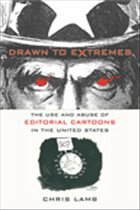"Judiciously balancing the mission of American editorial cartoonists with the restraints imposed by their editors and publishers, shrinking opportunities in print journalism, and public censorship in times of crisis, Professor Lamb has produced a volume rich in its insights and perspectives."
-Roger A. Fischer, author of Them Damned Pictures and professor emeritus of history, University of Minnesota-Duluth
Four days after the September 11, 2001, terrorist attacks, Pulitzer Prizewinning cartoonist Joel Pett of the Lexington (Ky.) Herald-Leader chided President George W. Bush for having declared that America would "punish any state that harbored or trained terrorists." In one of his cartoons, Pett asked if this included the state of Florida, where the terrorists had lived and taken flying lessons. When Pett followed with other criticisms of Bush, readers canceled subscriptions, demanded that Pett be fired, and left profane messages on his voice mail. "One elderly woman spat into the phone and said that I should have been in the World Trade Center," Pett said. "Such is the power of the cartoon, when it is unleashed."
Unrestricted by journalistic standards of objectivity, editorial cartoonists wield ire and irony to reveal the naked truths about presidents, business leaders, and other public figures. Indeed, since the founding of the republic, cartoonists have made an important contribution to and commentary on our society.
This book demonstrates the limits of cartooning from the courtroom to the newsroom. Chris Lamb examines the reasons for the declining state of the art and the implications for all of us. Most newspapers today publish relatively generic, gag-related, syndicated cartoons. They are cheaper and generate fewer phone calls than hard-hitting cartoons. Lamb charges that they are symptomatic of the foundering newspaper industry and reflect a weakness in the newspaper´s traditional watchdog function.
-Roger A. Fischer, author of Them Damned Pictures and professor emeritus of history, University of Minnesota-Duluth
Four days after the September 11, 2001, terrorist attacks, Pulitzer Prizewinning cartoonist Joel Pett of the Lexington (Ky.) Herald-Leader chided President George W. Bush for having declared that America would "punish any state that harbored or trained terrorists." In one of his cartoons, Pett asked if this included the state of Florida, where the terrorists had lived and taken flying lessons. When Pett followed with other criticisms of Bush, readers canceled subscriptions, demanded that Pett be fired, and left profane messages on his voice mail. "One elderly woman spat into the phone and said that I should have been in the World Trade Center," Pett said. "Such is the power of the cartoon, when it is unleashed."
Unrestricted by journalistic standards of objectivity, editorial cartoonists wield ire and irony to reveal the naked truths about presidents, business leaders, and other public figures. Indeed, since the founding of the republic, cartoonists have made an important contribution to and commentary on our society.
This book demonstrates the limits of cartooning from the courtroom to the newsroom. Chris Lamb examines the reasons for the declining state of the art and the implications for all of us. Most newspapers today publish relatively generic, gag-related, syndicated cartoons. They are cheaper and generate fewer phone calls than hard-hitting cartoons. Lamb charges that they are symptomatic of the foundering newspaper industry and reflect a weakness in the newspaper´s traditional watchdog function.

